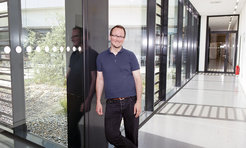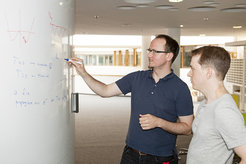New Junior Research Group at the MPSD
Michael Sentef receives funding for an Emmy Noether Group of the Deutsche Forschungsgemeinschaft on theoretical solid state physics
As part of the DFG’s Emmy Noether Programme, Michael Sentef receives one million euros over five years for setting up a junior research group on the “Theoretical Description of Pump-Probe Spectroscopies in Solids”. The group will start on the 1st of September and will be established within Angel Rubio’s theory department.

Ultrafast materials science is a research area located at the boundary between condensed matter physics, which investigates the physics of many interacting particles, and ultrafast spectroscopy, which investigates interactions between light and matter on small length scales and on ultrashort time scales. The experimental technique most commonly used in this field is the so-called “pump–probe spectroscopy”. In this technique a complex many-particle system is stimulated with a short “pump laser pulse”; a subsequent second “probe pulse” then monitors the excited state dynamics.
In his research project “Theoretical Description of Pump-Probe Spectroscopies in Solids”, Michael Sentef and his junior group want to theoretically understand the flow of energy from the pump laser into the solid on a microscopic level. Ordering mechanisms and their laser manipulation in complex states like superconductors or charge-density waves will be in the focus of the project. Another aspect will be to study how novel light-matter coupled states can be created, which enable tuning of the material properties in the presence of the pump laser. The lessons learned could then be used to design optimized materials with better functionalities.
To achieve the project goals, the team around Michael Sentef will work with analytical techniques as well as extensive numerical simulations on supercomputers.

“I am very happy that the DFG will fund my research so generously. The MPSD provides a very inspiring and ideal place for this research, since I can collaborate easily with the groups of Angel Rubio, Andrea Cavalleri, Martin Eckstein, and Isabella Gierz,” says Michael Sentef. “Five years from now we will hopefully see where pump-probe spectroscopies are headed, and whether they fulfill the promise of enabling revolutionary materials design. I hope I can contribute to this endeavor with my Emmy Noether group.”
Michael Sentef studied physics and mathematics at the University of Augsburg, which also awarded him a doctorate in theoretical condensed matter physics in 2010. Subsequently, he went to Stanford University and SLAC National Accelerator Laboratory for a three-year research stay in California. After a short postdoc stay at the University of Bonn, Michael Sentef came to the Max Planck Institute for the Structure and Dynamics of Matter in Hamburg to join the theory department of Angel Rubio as a senior postdoc in 2015.
The DFG’s Emmy Noether Programme supports researchers in achieving independence at an early stage of their scientific careers. Postdocs gain the qualifications required for a university teaching career during a DFG-funded period, usually lasting five years, in which they lead their own independent junior research group.

